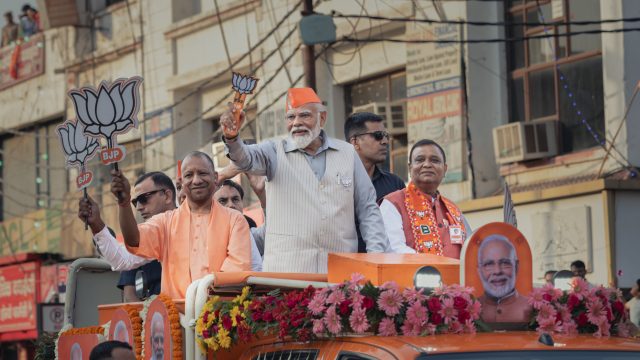
It’s not Election Day in India — rather, it’s more like Election Weeks. Plural. Voters in “the world’s largest democratic election” started heading to the polls last Friday, CNBC said, to start the first of seven phases of voting that will play out over six weeks. There probably aren’t many surprises in store at the end of that marathon: Prime Minister Narendra Modi and his Hindu-nationalist Bharatiya Janata Party (BJP) are expected to win “another landslide victory” that would give Modi a third five-year term in office.
That doesn’t mean the campaign has been placid. “Armed men attacked polling stations and captured voting booths” in the state of Manipur, The New York Times said, forcing authorities to redo early voting there. Modi himself received accusations that he had committed “hate speech” late in the campaign, CNN said, after he told a Hindu audience that Muslim opponents give “your hard-earned money” to “infiltrators.” And all that came after the election was plagued with AI-generated deepfake videos of Bollywood actors criticizing Modi.
There is also the question of whether these elections are fair. “India’s elections this year stand out for their undemocratic nature,” Christophe Jaffrelot said at Le Monde. Modi’s party has sought to transform the country into a Hindu state “where Muslims would be no more than second-class citizens.” Those efforts, he said, are turning India’s democracy into “electoral authoritarianism.”
‘Deep in the wilderness’
Modi isn’t the only figure in this election, however. He is opposed by Rahul Gandhi and the Indian National Congress Party. The party once ruled India almost unchallenged, The New York Times said, but now is “deep in the political wilderness” with fewer than 10% of seats in parliament. The challenge is steep: Modi’s critics are often investigated and imprisoned on “flimsy” evidence, and the major media outlets are controlled by his allies. It would take a “miracle” to dislodge the BJP from power. “Still, it falls to Gandhi, steward of his enfeebled party, to try.”
India’s opposition parties have formed a 27-member block called the Indian National Developmental Inclusive Alliance, CNN said, but so far “that alliance has proved lackluster.” It has been riven by ideological differences and hasn’t even named a candidate for prime minister. This means the question in this election isn’t whether Modi wins or not, said one observer, but if the opposition can stay “alive to fight another day so that democracy in India survives.”
While Modi is expected to win, observers are watching to see if his power slips in this election. There are questions about whether BJP “will be able to maintain the same overwhelming parliamentary majority it has enjoyed,” said The Guardian. “Simmering discontent” over a “chronic lack of jobs” for young people could undercut the party’s majority. A 400-seat majority could amend India’s constitution “and formally enshrine the country as a Hindu-first nation.”
Over mountains, through rivers
India’s massive size and huge population make the election a logistical challenge, Reuters said. Election officials must “climb down mountains, go through rivers or fly by choppers” to ensure that remote voters can have their say in the election, one official said. Nearly a billion people are eligible to vote, making the election “world’s largest election mobilization exercise of man and material.”
The election outcome will be felt abroad, said PBS NewsHour. The United States has come to rely on India as a regional counterbalance to the growing power of China, India’s next-door neighbor. But Modi’s government has also provoked criticisms from the U.S. and Canada over allegations of plots to assassinate Sikh separatist leaders in those countries. That makes the relationship challenging, but American officials still see the country as indispensable. A State Department official made that clear in March: “The single most important country in the world for the United States in the next 35 years will be India.”
Narendra Modi seeks a third term while critics worry about the future of the country’s democracy






